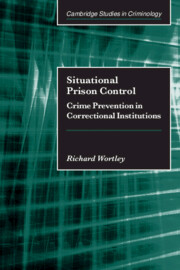Book contents
- Frontmatter
- Contents
- List of figures and tables
- Foreword
- Acknowledgements
- Part I Theoretical foundations
- Part II Specific behaviours
- 5 Prisoner-prisoner violence
- 6 Sexual assaults
- 7 Prisoner-staff violence
- 8 Self-harm
- 9 Drug use
- 10 Escapes
- 11 Collective disorder
- 12 Conclusions: hard and soft situational prison control
- List of references
- Index
10 - Escapes
Published online by Cambridge University Press: 22 September 2009
- Frontmatter
- Contents
- List of figures and tables
- Foreword
- Acknowledgements
- Part I Theoretical foundations
- Part II Specific behaviours
- 5 Prisoner-prisoner violence
- 6 Sexual assaults
- 7 Prisoner-staff violence
- 8 Self-harm
- 9 Drug use
- 10 Escapes
- 11 Collective disorder
- 12 Conclusions: hard and soft situational prison control
- List of references
- Index
Summary
As was the case for prison suicide and self-injury, so too there is a particular tendency for researchers and administrators to conceptualise prison escapes largely in terms of risky prisoners. The propensity to escape is considered a critical factor in the determination of a prisoner's security rating and so there have been a number of attempts to develop clinical and actuarial tools that might assist in the classification task (e.g. Farley and Farley, 1972; Scott et al., 1977; Shaffer et al., 1985; Thornton and Spiers, 1985). However, just like the research on prisoner suicide risk, research on prisoner escape risk has produced little of practical value. Studies have generally failed to find any personality factors that distinguish escapees from non-escapees (Brown et al., 1978; Clarke, 1980; Laycock, 1977: 17–34; Proteus and McLoughlin, 1974). While there has been more success in identifying some consistent socio-demographic trends related to escaping (most common offence categories of escapees, most likely stage of sentence escape takes place, etc.) (Gorta and Sillavan, 1991; Laycock, 1977: 34) there simply is no reliable way of determining with any certainty at an individual level just who is and who is not likely to escape.
Nature of the problem
Definition and incidence
A major problem in establishing the incidence of escapes from prison is the differing definitions of escape used from one jurisdiction to another. In many cases, the term ‘escape’ is used to describe any unlawful absence from custody (e.g. Centre for Research, Evaluation and Social Assessment, 1996: 6).
- Type
- Chapter
- Information
- Situational Prison ControlCrime Prevention in Correctional Institutions, pp. 173 - 189Publisher: Cambridge University PressPrint publication year: 2002



